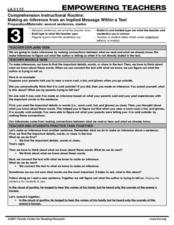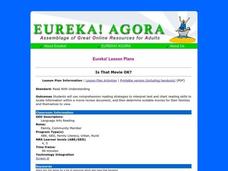Curated OER
Written Clues About the Past
Third graders investigate written clues from the past. In this clues from the past lessons, 3rd graders read and entry called, "Rick's Backyard Site." They complete the associated resource sheets. They read about a second site and use a...
University of Chicago
Using Artifacts for Clues About Identity
Learn about the ancient Near East through a close examination of ancient artifacts. Lead your class into analysis by first observing an artifact as a class. Pupils can then work in pairs to analyze the other artifacts and compile a list...
Grammar Net
Past Simple v. Past Perfect Simple
Help English learners tell the difference between the past tense and the past perfect tense with a grammar worksheet. As kids read twelve sentences, they change the given verbs to the correct tense based on context clues.
DocsTeach
Analyzing a Letter About Ford Pardoning Nixon
Out of the mouth of babes ... often times comes gems. The activity uses a letter written by a third-grader in 1974 regarding President Ford's pardon of Richard Nixon. Scholars analyze the letter, complete a worksheet, and participate in...
Curated OER
Understanding Clues from the Past: School Days
Third graders read primary and secondary sources as the study about schools in the early years of Kansas. In this primary and secondary source lesson, 3rd graders examine how historians use primary source documents to tell about the past...
Civil War Trust
Civil War Photography: Photography as a Primary Source
Can we learn a thing or two about history by looking at pictures from the past? As young historians view 2-D and 3-D primary source photographs, they respond to a series of worksheets that guides them toward unveiling clues about the past.
American Museum of Natural History
What Do You Know About Earth?
Time to rock and roll! Young scientists test their knowledge about rocks found on Earth and what they tell scientists. A 10-question quiz focuses on the different types of rocks, how they are formed, and what they are made of.
Jamestown-Yorktown Foundation
How Do We Know about Colonial Life?
Young history sleuths examine an inventory of the belongings of a Virginia colonist and use deductive reasoning to determine what the document reveals about colonial life. They then use a Venn diagram to compare the inventory with a...
American Museum of Natural History
What do you Know About Climate Change?
Test the class's knowledge of the key components of climate change. A 10-question online quiz asks learners about weather, climate, greenhouse gases, and several other concepts related to climate change. Interactive and easy for...
Curated OER
Making an Inference from an Implied Message Within a Text
Show your scholars that they make inferences every day and might not even know it. Through scaffolded instruction, they break down the process of drawing information from context. Using example sentences and didactic questioning,...
Curated OER
Verb Tenses
Discover how to use proper verb tenses with context clues. Five sentences help first graders decide if they should use -ed or -ing to end simple verbs. Each sentence provides context clues to indicate the time. Use the resource in...
Curated OER
Picture This
A unique writing lesson, this plan begins with learners talking about multiculturalism in small groups. Each learner will choose a picture from a newspaper, describe it to their small group, and think about how it relates to...
Curated OER
Is That Movie OK?
Discuss movies and movie enjoyment with your middle school language arts class. They interpret movie review information, determine appropriate movies, and then write film reviews to share with the class. Focus on using context clues to...
Curated OER
The Time Machine
Challenge your class with this lesson! Learners read The Time Machine by H.G. Wells, discuss context clues, identify main ideas and details, and analyze story elements. Discussion questions and activities are broken down for each chapter...
Curated OER
Ice Core Clues
Students create a PowerPoint presentation on the information they research about the ice cores and what they tell us about Earth's past. In this ice core lesson plan, students research radioactivity, air pollution, sodium, snowfall...
EngageNY
End of Unit 1 Assessment: Inferring and Synthesizing (From Two Texts) About Life in Colonial America
Close your colonial America unit with a performance-based assessment. Class members will show their proficiency in several skills including using details to back up inferences, determining the meaning of words in context,...
Center Science Education
Paleoclimates and Pollen
Demonstrate for your earth scientists how plant pollen of the past has become part of sedimentary deposits, providing clues about ancient climates. Then give them simulated sediment layer samples to analyze for different types of paper...
Curated OER
A Past Thing Past Tense Verbs
For this past tense verbs worksheet, students read about and discuss past tense verbs and underline the past tense verb in 6 sentences looking for the clue letters -ed.
Curated OER
Clues From the Past: Daily Life
Students discover the ways different cultures gathered and made food. In groups, they read excerpts from primary sources about the food people in Mesopotamia liked to eat. They work together to make a batch of goat stew and a loaf of bread.
Curated OER
Verbs; Simple Past (Regular Verbs)-2
In this foreign language worksheet, learners complete sentences by filling in the blanks. Each sentence contains a hint that gives the student a clue as to the intended final meaning of the sentence.
Curated OER
Dos mapas de Florida, el Caribe y parte de Sur America
What can maps tell us about the past? Find out with a Spanish lesson that incorporates geography. After examining maps individually, comparing two old maps of Spanish Florida and writing notes in the provided Venn diagram, pupils pair up...
Curated OER
Christmas and New Year Past Tenses Mimes
In this English worksheet, students, working with a partner, practice acting out one of thirty-three mimes with each other to see if their partner can guess what the other one is miming.
Curated OER
Digging Into the Past
Students participate in an excavation simulation, and explore the ruins of Sardis. They ponder which clues scientists use to determine if artifacts found in the excavation are of Persian, Greek, Roman, Byzantine, or Lydian origin.
Curated OER
Student-Designed Desks
High schoolers research school room from the past. They create a design for a school desk that is tailored to the specific needs of today's students. They evaluate group work and create a presentation.

























